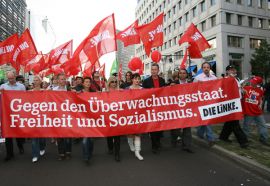PDS
Germany: Die Linke's road to an anti-capitalist program

By Dick Nichols, Erfurt
November 18, 2011 – Links International Journal of Socialist Renewal/Green Left Weekly -- Late on October 23, 2011, a chilly Sunday afternoon, the culminating vote of the program congress of Germany’s Left Party (Die Linke) came in Erfurt’s cavernous Congress Centre: 503 delegates raised their voting cards to support the document as finally amended by the congress, with only four against and 12 abstentions.
Germany: Big gains for Die Linke as Social Democrats’ support collapses

By Duroyan Fertl
October 5, 2009 – Germany’s ``centre-right’’ Chancellor Angela Merkel was returned to power in federal elections held on September 27, but with a record low voter turnout and an increased vote for the far-left party, Die Linke (The Left).
The election was a clear success for Merkel and her Christian Democratic Union (CDU). Her preferred coalition partner – the free-market fundamentalist Free Democratic Party (FDP) – increased its support by 4.8 per cent to an all-time high of 14.6 per cent, enough to form a CDU-FDP government. The FDP will now replace the CDU’s main rival – the ``centre-left’’ Social Democratic Party (SPD) – as coalition partner in the government of Europe’s largest economy.
At the same time, the SPD’s support collapsed by more than 6 million votes, dropping a massive11.2 per cent to only 23 per cent – its worst result since World War II. As one leading SPD member pointed out on election night, “We have been bombed back into the Weimar Republic”. SPD leader Walter Steinmeier described the result as “a bitter day” for German social democracy.
Germany: Die Linke, Hesse and the `super election’ year

By Duroyan Fertl
Germany: Die Linke, one year on (+ video)
By Thies Gleiss
One year after the foundation of the Die Linke (Left) party, commentators on both right and left agree that the political situation in Germany has been changed. Following three regional elections in spring 2008, Die Linke is solidly installed on the landscape.[1] On paper it is now the third biggest party in the country, whether in terms of members, elected representatives or other holders of paid political functions at all levels of the state, or again in terms of financial strength.
* * *
Germany's Die Linke: ‘We have the wind of history in our sails’
By Duroyan Fertl
May 30, 2008 -- After a year of stellar successes, almost 600 delegates from Germany’s new left-wing party, Die Linke, came together for the party’s first ever congress, held in the east German city of Cottbus on May 25 and 26. Former East German communist Lothar Bisky and former Social Democratic Party (SPD) national president Oscar Lafontaine, once dubbed by the media as “Europe’s most dangerous man”, were re-elected as co-chairs of the party, and a social justice-oriented platform was adopted for the coming period, which includes state elections in Bavaria this September and federal elections next year.
Die Linke was officially formed in 2007 as a fusion between the Party of Democratic Socialism (PDS — the successor to the former East German ruling party) and a collection of militants, unionists and socialists from the west organised as the Electoral Alternative for Jobs and Social Justice (WASG). Die Linke now has almost 80,000 members.
By Helmut Ettinger
The prospects for socialism (or barbarism)
Not long before the European elections, in which the social democratic vote collapsed, two of the most authoritative social democratic leaders, Tony Blair and Gerhard Schröder, published a letter in which they formulated the principles of the so-called "new centre" (neue Mitte). These principles could be summed up as arguing that the traditional ideas of social democracy (redistribution, a mixed economy and state regulation in the spirit of Keynes) needed to be replaced by new approaches in the spirit of neo-liberalism.
True, the authors of the letter took their distance from neo-liberalism itself, stating that they did not share its illusions that all problems could be solved through market methods. At the same time, they proposed to solve the problems of world trade by liberalising it further. Instead of solidarity, they called for increased competition, and instead of job creation, for preparing young people better for life under the conditions of a constantly changing market conjuncture.
Not a Europe of citizens: The EU on the road to military power